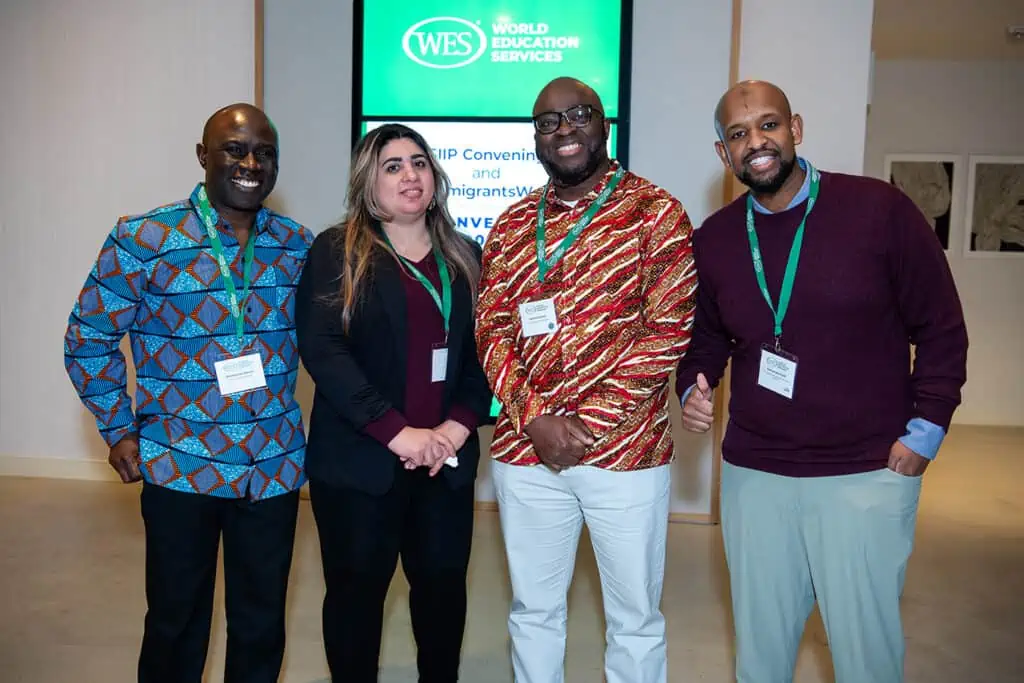To Successfully Welcome Refugees, We Must Build an Inclusive Workforce and Economy
This spring President Biden revised the annual refugee admissions cap to 62,500, reversing course on the record-low level of 15,000 set by the previous administration. The president’s decision ended months of uncertainty and reconfirmed the commitment of the United States “to protect the most vulnerable.” Following yesterday’s observance of World Refugee Day, the president can further demonstrate his intentions to welcome refugees by taking steps to ensure that their skills, credentials, and experience are fully valued in the nation’s workforce and economy.
The U.S. has a responsibility to aid the growing numbers of people displaced around the world, and there is precedent for ambitious admissions goals: Between 1980 and 2016, the U.S. admitted an average of 80,000 refugees per year, a number that held steady even during the Great Recession. The refugee admissions cap rose as high as 142,000 under President George H.W. Bush. And now, as the U.S. continues to respond to the COVID-19 pandemic and work toward economic recovery, the full inclusion of refugees in our workforce is critical.
Achieving both humanitarian and workforce development goals will require significant investment, innovation, and imagination—especially given the current state of the U.S. refugee resettlement program. The U.S. has admitted just 3,250 refugees since last October.
The previous administration slashed federal funding for refugee services, prompting agency closures and government staff furloughs both domestically and in field offices abroad. Most recently, the COVID-19 pandemic shuttered additional offices and disrupted resettlement and support services.
Refugee service providers and resettlement agencies now need an immediate, significant infusion of resources and staffing to rebuild the admissions infrastructure that brings refugees to the U.S. In addition, policymakers must increase support for workforce development and adult education programs that promote economic mobility and ensure that refugees can rejoin their career fields.
Refugee resettlement has traditionally focused on the short-term economic self-sufficiency of refugees at the cost of both their long-term career growth and the nation’s collective economic vitality. Newly arrived refugees are currently granted eight months or less of cash and medical assistance. This short window of economic support results in a race to find a job—any job—that will pay the bills.
For more than a decade, World Education Services (WES) and its partner organizations have seen the impacts of this ineffective approach to economic inclusion on the people we serve: A physician from Iraq works at a fast-food restaurant; an engineer from Kenya juggles multiple minimum-wage jobs to support his family. These workers came to the U.S. with credentials, professional experience, and aspirations to re-enter their fields. The rush to get a “rapid attachment” job, coupled with other barriers like limited professional networks, lack of recognition of international credentials, and complicated licensing processes, stalled their careers. Their individual stories are part of a larger, troubling trend. According to new research from Migration Policy Institute, at least two million refugees and immigrants with a college degree are underemployed or unemployed in the U.S.; 60 percent hold international credentials. This trend results in nearly $50 billion in forgone earnings and unrealized tax receipts each year.
Yet refugees and immigrants are essential to our communities and workforces, especially at this critical time of recovery. The resilience of refugees can catalyze new ways of working and help us respond to future crises. Employers who welcome refugee workers report higher employee retention rates and improved recruitment processes. Increased diversity and more inclusive workforces can foster innovation and financial returns.
A Refugee Resettlement Program That Ensures Equitable Opportunity
The U.S. refugee resettlement program must offer better outcomes. By making investments in four key areas, President Biden can create a system that opens pathways to jobs that pay a living wage to refugee workers and ensures a more inclusive, resilient economy for all Americans.
Scale the field’s expertise. A growing network of community-based programs has spent decades building career pathways for refugee workers, and now presents blueprints for the Biden administration to follow in bringing effective workforce integration to scale. Although the Refugee Career Pathways program, funded by the Office of Refugee Resettlement (ORR), has supported many of these initiatives since 2018, greater investments are needed.
Launch pre-arrival career pathway programs. Even after refugees are approved for resettlement in the U.S., months can pass before they arrive. This waiting period offers the opportunity to begin laying a foundation that will support their inclusion in the workforce. The U.S. currently offers a “cultural orientation” course prior to refugees’ arrival; the Biden administration can expand pre-arrival supports to include workforce-focused resources like access to online training programs, virtual networking opportunities, and vocational English language learning.
Support state efforts to make licensure more accessible. State-level professional licensing laws generally do not recognize international credentials. Refugees must often repeat significant portions of their training to qualify for licenses—a costly, time-consuming process. Others may have limited documentation of their international credentials as a result of displacement or conditions in their home country. The Biden administration can support states that are committed to reducing occupational licensing barriers by reinstating the work of the National Skills and Credential Institute, established in 2016.
Erect federal frameworks to support inclusion work. The White House Task Force on New Americans can be expanded to a permanent White House Office of New Americans (ONA), creating a first-of-its-kind federal office focused on strengthening refugee and immigrant integration. An ONA could launch a national employer engagement strategy designed to open career opportunities for refugees; it could also expand refugee access to adult education and workforce development programs. A federal-level ONA can also promote coordination among state and federal agencies working to support refugees.
President Biden has raised the refugee admissions goal; he now has the opportunity to invest in refugee job seekers and remove barriers to their economic mobility.
Find more information on WES’ recommendations for the Biden-Harris administration.





